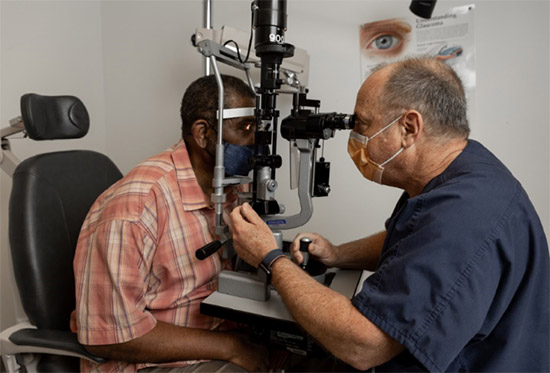Relentlessly seeking insights to improve prevention and treatment of glaucoma
 Recent studies conducted at the Ruiz Department of Ophthalmology and Visual Science at McGovern Medical School at UTHealth Houston, have uncovered valuable insights with potentially far-reaching benefits for managing or preventing glaucoma, a common eye disease with no known cure. Ophthalmologist Robert M. Feldman, MD, professor in the department and a specialist in adult and pediatric glaucoma, is the senior author on these investigations:
Recent studies conducted at the Ruiz Department of Ophthalmology and Visual Science at McGovern Medical School at UTHealth Houston, have uncovered valuable insights with potentially far-reaching benefits for managing or preventing glaucoma, a common eye disease with no known cure. Ophthalmologist Robert M. Feldman, MD, professor in the department and a specialist in adult and pediatric glaucoma, is the senior author on these investigations:
- “Risk Factors for Diagnostic Change from Glaucoma Suspect to Primary Open-Angle Glaucoma and Vice Versa Over Two Years,”Published in December 2024, this study aimed to identify the risk factors contributing to diagnostic differences. This is critical because undertreatment of diagnosed cases can lead to disease progression and vision loss, while overtreatment of patients only suspected of the condition is expensive and may lead to significant side effects. Results stressed the importance of patients seeing a glaucoma specialist able to correctly identify primary open-angle glaucoma (POAG) as early as possible.
- “Defining Glaucomatous Vision Loss in Large Datasets Based on the Temporal Relationship of Visual Field and Visual Acuity Loss,”Dr. Feldman and his team presented this project at ARVO 2024, the annual meeting of the Association for Research in Vision and Ophthalmology, Inc. The study attempted to increase the specificity of defining vision loss in patients based on their loss of best corrected visual acuity (BCVA). For many POAG patients who lose their sight, glaucoma is not always the cause. Other causes of vision loss include retinal detachment, endophthalmitis, and cerebral vascular accident. Results of the study showed that while the sensitivity of using visual field damage prior to a patient’s loss of BCVA was excellent, additional criteria are needed to increase specificity of this definition of blindness.
“Primary open-angle glaucoma is the world’s leading cause of irreversible blindness,” said Dr. Feldman, the Eunise Hermes Davidson Distinguished University Chair at McGovern Medical School. “By 2040, we estimate 118 million people will be affected by this very progressive disease. That’s why we are so focused on deepening our understanding of its causes, likely progression, and most promising treatments.”
Dr. Feldman is currently conducting an experiment on optimizing fluidics of the XEN® 45 Gel Stent glaucoma treatment system with surgical technique modification and a multi-institutional study for determining how to set target intraocular pressures to prevent blindness and impairment from glaucoma.
He and his team made three presentations at the ARVO 2025 conference in May, and will also make three presentations at the World Glaucoma Conference in June.